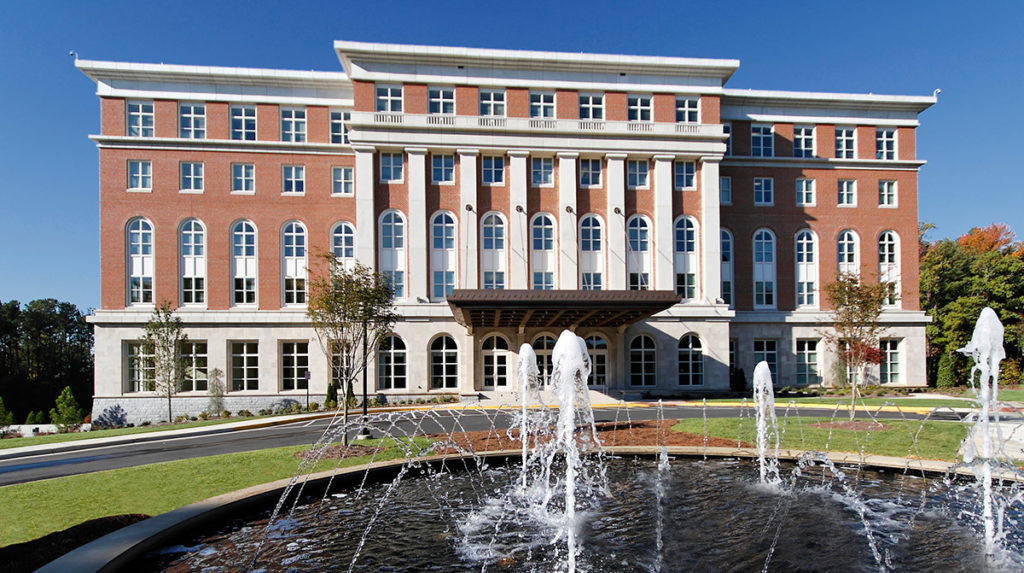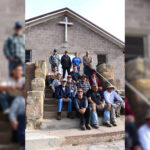
DULUTH, Ga. (BP) — Executive Director Thomas Hammond explained the need for a financial redirect for the Georgia Baptist Mission Board last month at the Executive Committee meeting. The bulk of his address cited losses over a 20-year period associated with the upkeep of properties such as Toccoa, Norman Park, Pinebloom, and the GBMB Missions and Ministry Center. The report also noted a significant decline in Cooperative Program giving over that period of time.
During this report, Hammond also alluded to previous actions taken to address financial challenges that resulted from COVID-19.
“We saw the potential impact of COVID-19 and took significant cost reduction steps April 1. Through salary and benefit reductions and staff level adjustments we’ve worked to right size our expenses to anticipated revenue shortfalls,” he said. “We had to do everything possible to reduce overhead in order to continue pushing more resources to the field.”
The GBMB’s annual financial audit in May which went before the Administration Committee and is available on the GBMB website compared the 2018 and 2019 fiscal years. The contrast between those years revealed the need to review the mission board’s spending history.
A further look uncovered the challenges that Hammond addressed with the Executive Committee in September 2020 – there were decades of overspending that have impacted the mission board’s financial standing. The problem, said Chief Operating Officer David Melber, was a pattern of overspending of millions of dollars over a period of at least 20 years.
Hammond began restructuring the mission board in January 2019 to address financial challenges and improve mission effectiveness. Part of this restructure included layoffs in early 2019. A review of the 2019 audit confirmed these actions were a move in the right direction but that more cost reductions would be necessary.
Over the past 20 years, non-budgeted expenses were paid with cash reserves from capital investments held by the Georgia Baptist Foundation. These funds offset shortfalls at Georgia Baptist-owned properties, on-going operational costs relating to employees, and retiree expenses. In addition, the GBMB granted funds at various times to assist the three Georgia Baptist colleges during periods of financial crises.
During this same time period there was a consistent decline in Cooperative Program giving. The downward turn began in 2007 with giving of $49,509,055 to a projected giving of $38,200,000 for 2020. Cooperative Program giving is currently down 7% for 2020 as compared to 2019. This current shortfall is resulting from the challenges many churches are experiencing from the pandemic.
“In [2019] we made cuts, but our cash position didn’t improve,” Melber said. “Throughout 2020 we subsidized the ongoing operational losses at Toccoa of over $1,000,000. An additional $600,000 was spent to ensure we were complying with engineering reports outlining concerns relating to the Lake Louise Dam on the Toccoa property. But also, the unsustainable levels of legacy retiree expenses, personnel benefits, declining CP giving, and the effects of COVID-19 all contributed to our current financial crisis.”
An outside CPA and consulting firm, CapinCrouse was contracted by the GBMB to give a review of the financial policies and procedures. They confirmed the assessment and recommended appropriate measures for a course correction.
Hammond compares the situation of the GBMB to the International Mission Board’s in 2015. That year, IMB leadership addressed a budget shortfall that had totaled $210 million over six years. The plan included a drawdown of some 1,132 missionaries and staff through normal attrition and voluntary retirement packages. In early 2016, IMB trustees agreed that though the steps exacted a professional and personal toll, they were necessary.
As a member of the IMB Board of Trustees, Paul Chitwood witnessed the tough decisions the entity had to make. Since becoming president in November 2018, Chitwood has witnessed first-hand the impact of those decisions on the financial health and missional vitality of the board.
“Those, indeed, were difficult decisions for IMB leadership to wrestle through and pray over,” Chitwood said. “As painful as they were, I see how, especially during the early days of the pandemic, those decisions allow us to navigate today’s challenges from a position of strength and focus. The IMB would not have the momentum it has right now were it not for the courage and sacrifice of those who made transitions and those who led through them.”
Hammond stated, “For the GBMB to arrive at the same level of financial health as the IMB it will require the discipline to operate within Cooperative Program gifts provided by Georgia Baptists and associated revenues. It is imperative for us to eliminate expenses that are beyond budget.”
Melber stated, “Due to the fact we didn’t have a comprehensive budget money was being spent that we didn’t have for a number of years. Next year, the budget … will be the budget.”
Beyond operational corrective actions the GBMB has taken steps to liquidate properties that are financially unsustainable or not aligned with their mission.
“While the sale of these assets will help stabilize our current circumstances, we are putting in place financial policies and procedures to ensure a healthy financial position going forward,” Melber said.
Hammond concluded, “While these decisions have been difficult and circumstances challenging, I truly believe the days ahead are filled with tremendous opportunity for Georgia Baptists to advance the Kingdom and bring glory to God.”




















